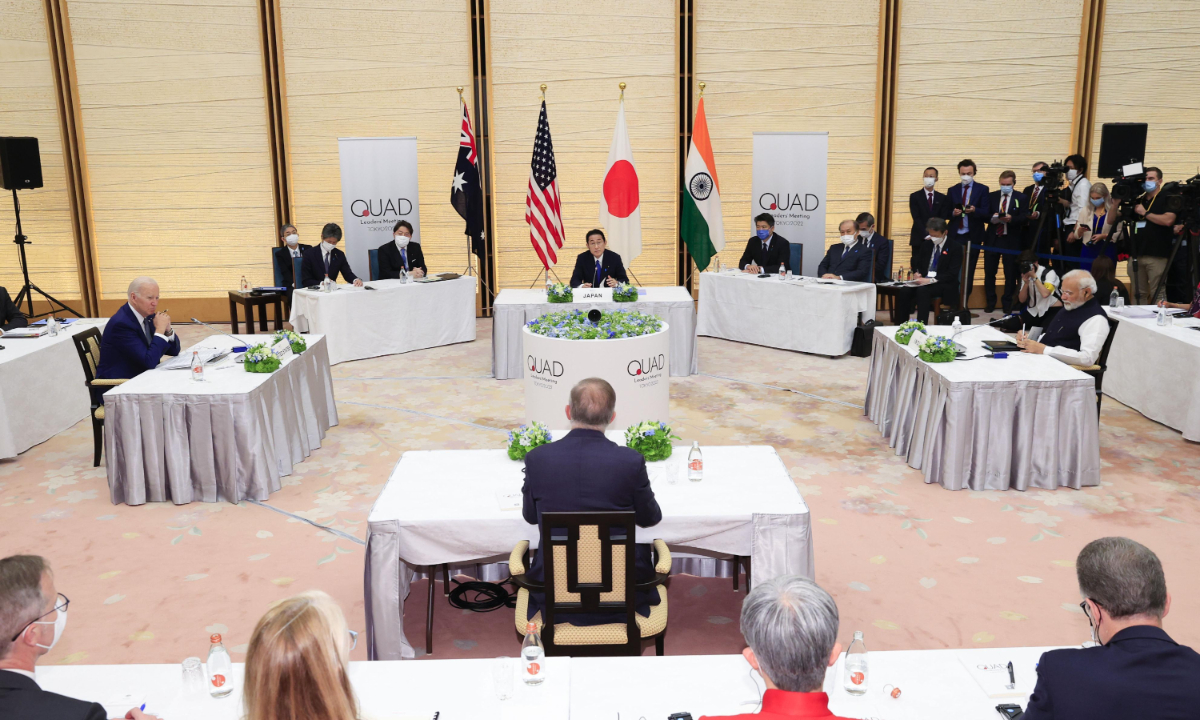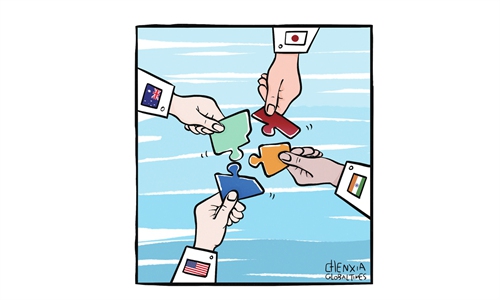
Quad summit in Tokyo on May 24, 2022. Photo: IC
The foreign ministers of the US, Australia, India and Japan are making arrangements to hold a meeting in New York on the fringes of the UN General Assembly's annual general debate session starting from September 19, Japanese media said, quoting diplomatic sources.
However, while Japanese media is hyping up the four-way meeting in September, other Quad member countries are seemingly choosing to remain silent. The subtle difference in volume is also a reflection of the disunity straining Quad, said experts.
According to Kyodo News, China's "expanding military and economic clout in the Indo-Pacific region" and the Ukraine crisis are likely to be among the topics discussed. The report also said that the Quad members are expected to release an outcome document after talking about issues including economic security and climate change.
Japan's Yoshimasa Hayashi will likely call for support from his counterparts for Japan's release of radioactive water from the Fukushima nuclear complex into the sea, the sources said, as quoted by Kyodo News.
Facing overwhelming opposition from neighboring countries for dumping nuclear-contaminated wastewater from the crippled Fukushima Daiichi nuclear power plant into the sea, Japan is eager to seek support from other countries as it comes under tremendous international pressure, and this foreign ministers' meeting will be one of its efforts, Lü Xiang, research fellow at the Chinese Academy of Social Sciences, told the Global Times on Thursday. This is one reason why the Japanese side is eager to hype up the Quad foreign ministers' meeting, he said.
However, Japan's eagerness has not been echoed by other countries. This difference in volume clearly reveals the divisions among the member countries within Quad, observers noted.
Quad, officially the Quadrilateral Security Dialogue, is generally a verbal assurance that can barely be counted as an alliance, Lü said, pointing out that the four countries are greatly strained by disunity.
India joined this loose alliance with an opportunistic attitude, he said. While the US has tried to draw India into its exclusionary camp, New Delhi has not abandoned other mechanisms of international cooperation such as BRICS and SCO.
"While India wants to enlist US support on its dispute with China, at the same time it is trying to leverage other platforms to constrain US influence," Lü noted. "The US wants to use India to constrain Russia, but for India, it's not paying off."
Australia, on the other hand, is the country that the US would most like to bring on board in this mechanism, especially at the military level. However, Australia will have to pay great direct costs and expose itself to future strategic risks if it wants to join the US system, said the analyst.
Although Japan badly needs US support on the issue of dumping nuclear-contaminated wastewater and leverages US power to maintain its position in East Asia, it also knows that its own security cannot be guaranteed if it panders to the US, Lü said.
Analysts pointed out that although the US has recently tried to draw in various Chinese neighboring countries to create cliques and check China, there has not been an obvious effect. Many countries have also come to realize that there is no way they can get the assurances they want from the US.
Lü believes that the Quad foreign ministers will reach some consensus in September, but it will be more of a formality.
On the Ukraine crisis, the South China Sea, the Taiwan Straits, and nuclear-contaminated wastewater, they will most likely take a stand, Lü said, noting that this superficial consensus will not lead to substantive progress or change in the Quad's internal divisions.
The ministers of Quad last met in March in New Delhi, during which they reaffirmed the grouping's commitment for a "free and open Indo-Pacific," releasing an 18-point joint statement that analysts viewed as lousy clichés with a confrontational mentality, as it singled out Russia and North Korea on regional security issues and played up the "China threat" in a subtle and veiled way.

